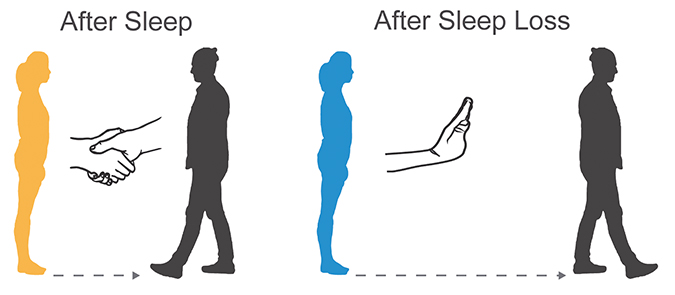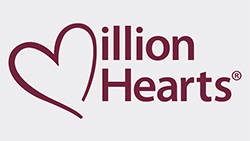Pulse points
From their labs to their personal lives, scientists now are addressing wellness and working to raise awareness about mental health issues. Here we offer links to work in this area, including a study on how sleep deprivation can lead to loneliness, an initiative to improve heart health and research on worms under extreme stress.
Out of the dark
Susanna Harris is a graduate student studying microbiology at the University of North Carolina School of Medicine. Last summer, she gave a talk for The Monti, a series of live shows in which guests share personal stories. In her talk, she shared her experience with depression after failing an exam in graduate school and how she came through the other side of what she described as “months of crushing darkness.” Watch her and follow her on .
from on .
Stressed worms

Researchers funded by the National Institutes of Health the impact that environmental stress can have on the nervous systems of roundworms called Caenorhabditis elegans. A news release from the NIH explained that when C. elegans are exposed to a stressor, such as starvation, they stop developing temporarily and then continue growing after the stressful situation has passed. Researchers studying worms before and after a period of stress concluded that stress rewired the worms’ nervous systems.
Shunned and sleepless
Researchers at the University of California, Berkeley, that sleep-deprived people not only feel lonelier, but also alienate others. Matthew Walker : “The less sleep you get, the less you want to socially interact. In turn, other people perceive you as more socially repulsive, further increasing the grave social-isolation impact of sleep loss.” The team used brain imaging, simulations and other tools to measure the social implications of poor sleep.
 COURTESY OF MATTHEW WALKER AND ETI BEN SIMON
COURTESY OF MATTHEW WALKER AND ETI BEN SIMON Feel like a fraud?
Julia Omotade, Jamie King and Richard A. Kahn wrote in this magazine in February 2017 that the term “” is used “to describe the chronic and potentially lifelong feelings of inadequacy and self-doubt that affect performance and professional outcomes.” Have you experienced these feelings in your educational or professional career? If so, you’re not alone and there are ways to overcome them. Elizabeth Cox answers the question “What is imposter syndrome and how can you combat it?” in a .
Pulse points: Healthy hearts

Researchers at the Centers for Disease Control and Prevention and Agency for Healthcare Research and Quality project that there will be about 16.3 million cardiovascular events and upwards of $173.7 billion in hospitalization costs between 2017 and 2021 if interventions in clinical settings and communities are not implemented. For those reasons and others, the CDC and Centers for Medicare & Medicaid Services launded the Million Hearts initiative. The initiative brings together state and federal agencies and private-sector partners to prevent 1 million cardiovascular events by 2022. Read it .
Enjoy reading ASBMB Today?
Become a member to receive the print edition four times a year and the digital edition monthly.
Learn moreFeatured jobs
from the
Get the latest from ASBMB Today
Enter your email address, and weтАЩll send you a weekly email with recent articles, interviews and more.
Latest in Careers
Careers highlights or most popular articles

Science & sightseeing: The best of Chicago
While enjoying the cutting-edge science at #ASBMB25, check out ChicagoтАЩs diverse culture, iconic landmarks delicious food and more recommended by the ASBMB Student Chapter members at Loyola University Chicago.

Summer internships in an unpredictable funding environment
With the National Institutes of Health and other institutions canceling summer programs, many students are left scrambling for alternatives. If your program has been canceled or delayed, consider applying for other opportunities or taking a course.

Upcoming opportunities
Wrap up #ASBMB25 in style! Join us for a closing reception at the Griffin Museum of Science and Industry.

ChicagoтАЩs scientific interface
Experience the iconic Griffin Museum of Science and Industry at the ASBMB 2025 Annual Meeting closing reception, where history, innovation and hands-on discovery come together. Network, explore unique exhibits and celebrate scientific progress.

Upcoming opportunities
Register for ASBMB's webinar on cloud AI systems for biomedical research optimization and bias mitigation. Plus: Submit an abstract and register тАФ at the early rate тАФ for ASBMB's meeting on ferroptosis by March 12!

Black excellence in biotech: Shaping the future of an industry
This Black History Month, we highlight the impact of DEI initiatives, trailblazing scientists and industry leaders working to create a more inclusive and scientific community. Discover how you can be part of the movement.

